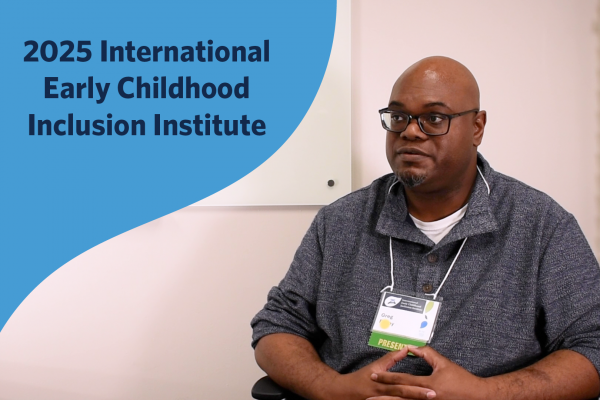
Reflections from the 25th International Early Childhood Inclusion Institute: Gregory Facey
What can happen when a child with disabilities is included in a traditional care setting with their peers without disabilities―where they can interact, learn, and play together in a universally designed environment, with adaptations, modifications, or accommodations built to support their full participation? For decades, the UNC Frank Porter Graham Child Institute (FPG) has led the way, proving that with the right institutional support, technical assistance, professional development, implementation, and advocacy, young children both with and without disabilities thrive in remarkable ways when they’re in inclusive environments.
Earlier this year, the International Early Childhood Inclusion Institute celebrated a quarter-century of FPG’s longstanding work in early childhood inclusion. Presentations and discussions at the event recognized the voices and experiences of children with disabilities and their families and highlighted the critical contributions of individuals with disabilities, families, practitioners, policymakers, and many other leaders in the field who have worked tirelessly to create more inclusive environments.
We had a chance to speak with some of this year’s presenters and attendees and will be sharing those conversations with you in a short series of articles over the coming weeks. In this article, you’ll hear from Gregory Facey, a father of two children with hearing loss, and member of the Black Fathers Crew.
What were you most looking forward to sharing as part of your presentation?
What I was looking forward to share the most about in my presentation was focusing on sharing more information about what Black fathers need from service providers, how we want to be engaged and involved in those decision making situations with our kids, and really to showcase what are some of the struggles that are happening, as well as some of the great things that are happening in that space.
Why was it important for you to share that at this particular conference?
It was important to me to come to the Inclusion Institute to showcase a new set of voices and perspectives in the area. For fathers in this space to really have a voice, really advocate for what we need to support our kids in the communities that we're involved in and provide additional insight to service providers.
What is a takeaway that you would share with anybody considering coming to the Inclusion Institute?
I think the biggest takeaway for me, and why I think other people should join, is for not just service providers, but also parents to get a new perspective, get additional insight and tools and resources that they can bring back home so they can be strong advocates for what they need.
What role do parents play in advocating for inclusion?
The biggest role that parents can play for inclusion and advocacy is being present, being aware of what's available, what challenges their kids may be having, who's on their side, and how funding is structured. I think that's incredibly important in this space, knowing how the resources are going to be adopted for your child.